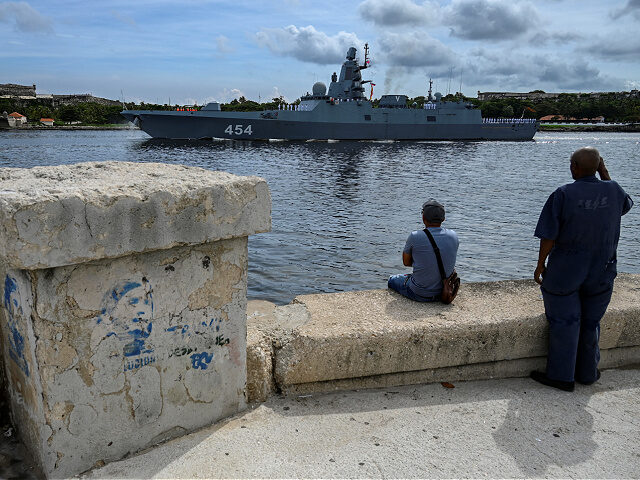Three war vessels from Russia’s Baltic Fleet arrived in Havana, Cuba, this weekend for a four-day “work visit” to the communist nation that will reportedly conclude on Tuesday.
The Russian state news agency Tass reported on Saturday that the three Russian Baltic Fleet warships — identified as the training ship Smólny, the patrol ship Neustrahimiy, and the offshore oil tanker Yelnya — will conduct an “extensive program” during its four-day port call that includes courtesy visits to officials from the Cuban Navy and other authorities of the communist Castro regime.
The Russian crew will also visit Havana and, according to the Cuban Ministry of the Revolutionary Armed Forces, “places of historical and cultural interest.”
Cuban defense officials announced the latest port call this week, calling the arrival of the Russian warships a “historical practice” and show of “friendship and collaboration.” Neither government elaborated on the purpose of this latest deployment. Cuba reportedly greeted the Russian fleet with a booming cannon salute upon their arrival on Saturday.
The ongoing visit of the three vessels marks the second Russian fleet visiting the communist nation in less than two months. In June, Russia sent the Admiral Gorshkov frigate, the nuclear submarine Kazan, and two accompanying vessels to Cuba after the flotilla conducted naval exercises in the Caribbean Sea.
“The ships’ arrival aroused the keen interest of Havana residents who greeted our sailors from the city embankment,” the Russia embassy in Cuba stated. “The training ship ‘Smólny’ will be open to the general public on July 28-29.”
Similarly to June’s visit, Castro regime officials, who have not publicly disclosed further information on the latest Russian fleet stop, described the port call as part of a “historical practice between the Caribbean nation and friendly countries.” An unnamed U.S. Northern Command spokesperson told Reuters that “Russia’s deployments in the Atlantic pose no direct threat or concern to the United States.”
Russia, a top financier of the ailing Castro regime, has received the consistent support of its long-standing ideological ally in its ongoing invasion of Ukraine. Reports published since 2023 have indicated that Cuban citizens are actively being conscripted and sent to fight for Russia against Ukraine under false pretenses — and are offered a fast track to Russian citizenship at the end of their service.
Although the Castro regime claimed last year that it had “dismantled” alleged trafficking networks recruiting Cubans to send them to Russia under false pretenses, Bloomberg reported in mid-July that Russia continues to enlist Cubans through “informal channels,” eventually conscripting them to fight against Ukraine.
In recent years, the Castro regime has found itself seeking an increased amount of Russian aid to help offset Cuba’s severe economic and humanitarian crisis, wrought by more than six decades of communist mismanagement.
Since 2023, Russia has sent growing amounts of supplies such as cooking oil and wheat to Cuba, with Russian officials promising in March that they would supply the communist-ruined nation with a “steady supply” of hydrocarbons, fertilizers, and basic products. In that same month, Russia resumed its oil shipments to Cuba, which the Castro regime has employed in a desperate effort to ease ongoing fuel shortages and to keep its derelict power plants running.
Officials from both regimes held talks in Havana last week for the construction of a new oil refinery in Cuba that, if built, would join the communist-ruled nation’s four other rundown refineries.
“Cuba has crude oil, it is logical not to import oil products, but to produce them here,” Russian Duma Deputy Speaker Alexander Babakov said. “The largest Russian companies could participate here.”
Christian K. Caruzo is a Venezuelan writer and documents life under socialism. You can follow him on Twitter here.

COMMENTS
Please let us know if you're having issues with commenting.